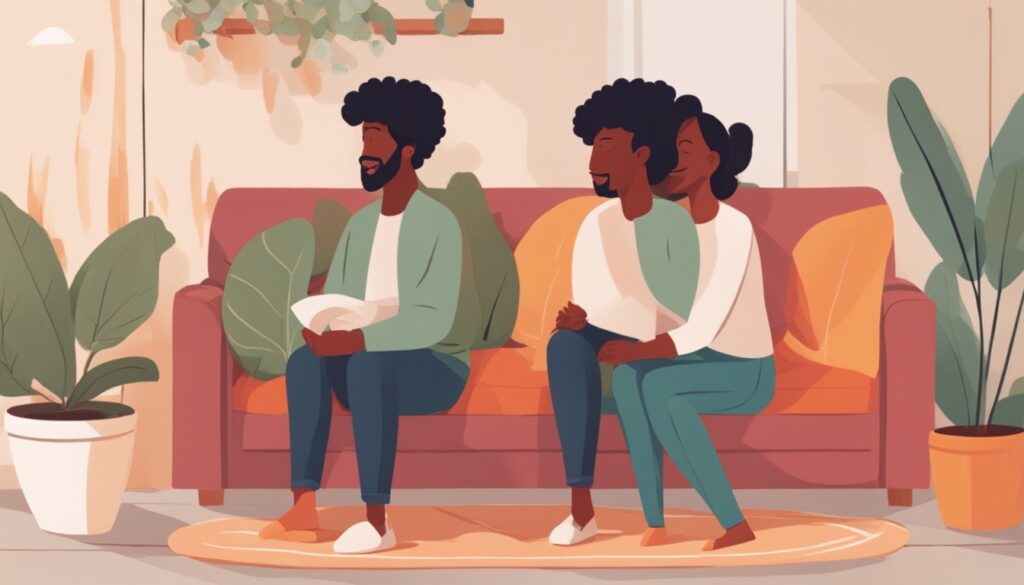Imagine a moment when you and your partner are engaged in a heartfelt conversation. As you open up, sharing your deepest thoughts and feelings, you can feel the connection growing stronger. The words flow effortlessly, and you can see understanding and empathy in your partner’s eyes. In that moment, you experience a sense of profound closeness, trust, and love.
We all yearn for these moments of authentic connection in our relationships. Whether it’s with a romantic partner, family member, or friend, effective communication is the key to nurturing healthy, fulfilling connections. It is the lifeblood that sustains relationships and fuels emotional intimacy.
But what does effective communication truly entail? It goes beyond simply speaking and listening. It’s about actively engaging with one another, understanding each other’s emotions, and finding common ground. Effective communication is a powerful tool that can resolve conflicts, enhance understanding, and strengthen the bonds we share.
In this article, we will explore the strategies and techniques that can help you foster effective communication in your relationships. From understanding the importance of healthy communication to learning practical tips for conflict resolution, we’ll provide you with valuable insights to improve your connection with others.
Key Takeaways:
- Positive social interactions increase subjective wellbeing and life satisfaction.
- Effective communication deepens connections, improves teamwork, and enhances problem-solving.
- Nonverbal communication plays a crucial role in building relationships and expressing intentions.
- Healthy communication skills include active listening, validation of feelings, and understanding differing perspectives.
- Seeking professional help, such as couples therapy, can enhance communication and conflict resolution skills.
The Importance of Healthy Communication in Relationships
Effective communication is the foundation of a healthy relationship. It plays a crucial role in enhancing relationship communication and improving interpersonal communication. When couples practice healthy communication patterns, it not only increases relationship satisfaction but also leads to increased intimacy.
Research has shown that couples in long-term relationships who engage in healthy communication are more likely to experience higher levels of relationship satisfaction. They are better equipped to navigate conflicts and resolve relationship issues. Effective communication allows partners to express their thoughts, feelings, and needs openly, promoting understanding and connection.
One study compared communication styles between couples in long-distance relationships and those in close proximity. It found that couples in long-distance relationships often rely on audio and visual mediums, such as video calls, for deeper discussions compared to text messages. This highlights the importance of utilizing different communication methods depending on the circumstances to promote effective communication.
Communication involving active listening and mutual understanding is key to resolving conflicts and strengthening relationships over time. When individuals actively listen to their partner’s perspective, it fosters empathy and builds trust. Additionally, practicing personal responsibility and admitting faults during conflicts shows maturity and can lead to mutual understanding between partners.
According to a study conducted by the University of Michigan, a significant majority (65%) of conflicts in relationships arise due to issues in communication. This emphasizes the importance of addressing communication patterns and equipping oneself with effective communication strategies to prevent conflicts from escalating.
“Effective communication strategies can lead to a 75% decrease in the likelihood of conflicts escalating to arguments or causing a relationship breakdown,” says Leader Effectiveness Training.
Utilizing “I Statements” in conversations about relationship issues has been shown to increase the chances of resolving conflicts by 50% compared to accusatory statements. This approach promotes open and non-confrontational dialogue, allowing partners to express themselves without blaming or attacking the other person.
Incorporating techniques such as active listening, which is part of the LARA (Listen, Affirm, Respond, Add) technique, has been proven to improve relationship satisfaction by 60%. When individuals feel heard and understood, it deepens their emotional connection and strengthens the overall relationship.
By implementing the LARA technique and focusing on healthy communication patterns, there is a 70% increase in both individuals feeling respected and valued in the relationship. This creates a supportive environment where both partners can express themselves authentically, fostering a stronger bond.
Overall, healthy communication is essential for building and maintaining successful relationships. It improves relationship satisfaction, increases intimacy, and helps couples navigate conflicts more effectively. By prioritizing healthy communication patterns and utilizing effective strategies, couples can create a strong foundation for a fulfilling and long-lasting relationship.
| Communication Statistics | Percentage |
|---|---|
| Conflicts arising from communication issues | 65% |
| Decrease in likelihood of conflicts escalating to arguments or causing a relationship breakdown | 75% |
| Increase in chances of resolving conflicts with “I Statements” compared to accusatory statements | 50% |
| Improvement in relationship satisfaction through active listening | 60% |
| Increase in feeling respected and valued through the LARA technique | 70% |
Implementing healthy communication patterns and utilizing effective strategies can significantly enhance relationship communication and improve interpersonal communication.

Tips for Effective Communication in Conflict Resolution
During conflicts, it is essential to practice effective communication skills. By employing active listening skills, conflict resolution strategies, and fostering emotional connection, you can navigate difficult conversations and strengthen your relationship.
Active Listening Skills
Active listening is the foundation of effective communication. It involves giving your undivided attention to your partner, demonstrating empathy, and striving to understand their perspective. Avoid interrupting or getting defensive, instead, focus on truly hearing what your partner is saying.
By actively listening, you show your partner that their thoughts and feelings are valued, fostering open and honest communication. Reflecting back what your partner is saying can help them feel heard and understood.
Conflict Resolution Strategies
Conflicts are inevitable in any relationship, but it is how you handle them that determines the outcome. Instead of aiming to “win” the argument, prioritize finding solutions that meet both partners’ needs.
Take responsibility for your actions and be willing to admit when you are wrong. This displays maturity and helps build trust. By focusing on resolution rather than blame, you can work together to find mutually beneficial solutions.
Fostering Emotional Connection
Emotional connection is the glue that holds a relationship together. During conflicts, it is essential to maintain and foster this connection. Remember that your partner’s emotions are valid, even if you don’t agree with their perspective.
Instead of becoming defensive or dismissive, strive to understand their emotions and validate their feelings. Emotional validation goes a long way in strengthening the emotional bond between partners.
Fostering emotional connection requires empathy, understanding, and active effort to prioritize the emotional well-being of both partners.
Communication Styles in Relationships
| Communication Style | Description |
|---|---|
| Passive | Refraining from expressing thoughts and feelings, leading to tension buildup until emotions are eventually released explosively. |
| Aggressive | Loud speech, frequent interruption, criticism, blame, and dominance over the partner’s needs. |
| Passive-Aggressive | Subtly hinting at needs while expressing feelings of helplessness and resentment in subdued ways like sarcasm or eye-rolling. |
| Assertive | Articulately advocating for one’s needs without demeaning the partner’s feelings, showing good self-control and respect for both individual and partner needs. |

Effective communication in conflict resolution requires active listening skills, employing conflict resolution strategies, and fostering emotional connection. By practicing these skills, you can strengthen your relationship and navigate conflicts more effectively.
Strategies to Improve Communication During Conflict
Conflict is inevitable in relationships, but how we communicate during those conflicts can make all the difference. Utilizing healthy communication techniques, resolving conflicts, and practicing empathy can help couples navigate disagreements and come to constructive resolutions. Here are some strategies to improve communication during conflict:
- Choose the right time: Address the issue when both partners are calm and willing to listen. Avoid bringing up past hurts or unrelated topics that can derail the conversation.
- Be honest and respectful: Express your thoughts and feelings honestly, using “I” statements to avoid sounding accusatory. Respectful communication sets the foundation for a constructive conversation.
- See the other person’s perspective: Truly listen and try to understand your partner’s point of view. Validate their feelings and acknowledge their perspective, even if you disagree.
- Respond with empathy: Empathy is key in resolving conflicts. Put yourself in your partner’s shoes and try to understand their emotions and concerns. Look for what is true in their criticism, as it can provide insights and lead to a more constructive resolution.
- Use “I” statements: Instead of blaming or attacking your partner, focus on expressing your own feelings and needs using “I” statements. This personalizes the conversation and promotes understanding rather than defensiveness.
By implementing these healthy communication techniques, couples can create a safe space for resolving conflicts, fostering empathy, and strengthening the emotional connection in their relationship.
Example Table: Effective Communication Strategies During Conflict
| Effective Communication Strategies | Description |
|---|---|
| Active Listening | Pay full attention, reflect on what your partner is saying, and seek clarity when needed. |
| Validation | Acknowledge and validate your partner’s feelings without dismissing or minimizing them. |
| Empathy | Put yourself in your partner’s shoes and make an effort to understand their perspective. |
| Respectful Language | Use respectful and non-aggressive language to avoid escalating conflicts. |
| Problem-Solving Approach | Focus on finding solutions instead of assigning blame. Collaborate to meet both partners’ needs. |
| Take Breaks | If emotions run high, take a break from the conversation to cool off before continuing. |
Implementing these strategies can help couples navigate conflicts more effectively, leading to healthier and more satisfying relationships. By fostering open and empathetic communication, couples can build trust, resolve conflicts, and strengthen their emotional bond.

Taking Breaks and Seeking Professional Help for Communication Improvement
Sometimes, conflicts become too heated to continue the discussion constructively. In such cases, it is acceptable to take a break and come back to the conversation when both partners have cooled off. However, it is crucial to eventually resolve the conflict and not give up on communication. Taking breaks during conflict allows both parties to collect their thoughts, calm their emotions, and approach the discussion with a clearer mind. This can prevent further escalation and provide an opportunity for productive dialogue.
However, it’s important to note that taking a break shouldn’t be used as a way to avoid addressing the issue altogether. The intention should always be to return to the conversation and work towards a resolution. Leaving conflicts unresolved can lead to resentment and communication breakdowns in the long run.
In cases where couples find it challenging to navigate conflicts on their own, seeking professional help can be beneficial. Couples therapy or counseling provides a safe space for couples to explore their communication patterns, identify areas for improvement, and learn effective techniques to resolve conflicts.
Couples therapy can offer guidance and teach valuable communication skills that can aid in future conflict resolution. Therapists trained in nonviolent communication techniques can help couples establish a foundation of mutual understanding and empathy. These professionals can provide tools and strategies to facilitate healthy communication, including active listening, expressing emotions constructively, and seeking clarity rather than focusing on winning arguments.

Benefits of Couples Therapy and Counseling
Here are some ways in which couples therapy and counseling can improve communication:
- Guidance: Therapists can offer guidance tailored to each couple’s specific needs and circumstances. They can help identify underlying issues, improve communication skills, and provide techniques to resolve conflicts effectively.
- Safe Space: The therapy room provides a safe and neutral environment where both partners can express their thoughts and feelings without judgment or prejudice. This can foster open and honest communication.
- Objective Perspective: Therapists bring an objective viewpoint to the table, allowing them to see communication dynamics that may be difficult for the couple to recognize themselves. Their guidance can offer fresh insights and perspectives.
- Improved Understanding: Couples therapy emphasizes the importance of understanding each other’s perspectives and validating feelings. Therapy sessions facilitate empathetic listening and create opportunities for partners to develop a deeper understanding of one another.
- Building Trust: Effective communication is crucial for rebuilding trust in a relationship. Couples therapy provides a structured and supportive environment for partners to work together in rebuilding trust and improving their overall communication.
Seeking couples therapy or counseling is not a sign of weakness but rather an action taken toward building healthier communication habits. Remember, communication is a skill that can be learned and improved through practice. Utilizing the guidance and expertise of professionals can significantly enhance relationship communication skills and foster a stronger connection between partners.
Table: Benefits of Couples Therapy
| Benefits of Couples Therapy |
|---|
| Guidance tailored to specific needs |
| Safe space for open and honest communication |
| Objective perspective and insights |
| Improved understanding and empathy |
| Rebuilding trust and strengthening the relationship |
Effective Communication in Long-Distance Relationships
In long-distance relationships, maintaining open lines of communication is crucial. Although texting may be convenient for day-to-day conversations, it may not be the best method for managing conflicts or expressing complex emotions, as it can often lead to misunderstandings. To foster a stronger emotional connection, it is recommended to utilize audio or visual mediums, such as phone calls or video calls, which provide an opportunity for increased intimacy and better understanding.
Staying present during conversations is key, as it shows your partner that you value their time and attention. Engage in active listening by focusing on what they are saying, asking questions to deepen your understanding, and offering validation to their thoughts and feelings. By doing so, you create a safe and supportive environment where both partners can express themselves openly.
Consistency is vital in long-distance relationships. Define and schedule regular communication times that work for both partners. This allows you to establish a routine and ensures that you have dedicated quality time to connect and catch up. Whether it’s daily video chats, calls, or even regular texting, these check-ins are essential for maintaining a strong bond.
Effective communication in long-distance relationships is about more than just sharing information; it’s about maintaining a sense of closeness and intimacy, despite the physical distance.
Planning visits or meet-ups at regular intervals is another important aspect of fostering intimacy despite the distance. Having something to look forward to can help both partners feel excited and connected, knowing that they will have the opportunity to spend quality time together. It’s important to find a balance that works for both of you, taking into consideration work schedules and other commitments.
Flexibility plays a vital role in making long-distance relationships work. Both partners should be open to adjusting plans and commitments to make room for quality time together whenever possible. Unexpected situations may arise, and being understanding and accommodating can strengthen the relationship and show your commitment to making it work.
Shared interests, values, and hobbies are powerful bonding factors in long-distance relationships. Engaging in activities that align with these shared values can create a sense of connection and create new experiences together, even from a distance. Participating in spiritual practices, volunteering, or even watching a show or reading a book together can help deepen your bond.
To maintain a long-distance relationship, it requires continuous care and attention. Think of it as regular maintenance for a car. Just like a car needs oil changes and tune-ups to stay in good condition, a long-distance relationship requires consistent effort. Assess the health of your relationship regularly through honest conversations about your feelings, needs, and expectations, and address any concerns or issues that may arise.
Finally, commitment serves as the foundation of a successful long-distance relationship. Define your long-term goals as a couple and set a specific date for being together in person again. This gives both partners a shared vision and something to work towards, providing hope and reassurance during the challenging times of being apart.

The Goal of Healthy Communication in Relationships
In any relationship, the goal of healthy communication is to establish mutual understanding and facilitate conflict resolution. When communication is effective, it fosters emotional connection and strengthens the bond between partners. By focusing on open and honest dialogue, couples can navigate challenges and achieve greater relationship satisfaction.
One study supports the idea that effective communication increases relationship satisfaction, highlighting the importance of healthy communication patterns in promoting intimacy. Whether in romantic partnerships or friendships, communication serves as the foundation for building trust, resolving conflicts, and maintaining a strong emotional connection.
Couples in long-distance relationships face unique communication challenges compared to those who are physically close. With limited opportunities for face-to-face interaction, long-distance couples may rely more on audio and visual mediums, such as phone calls and video chats, to foster intimacy. This emphasis on audio and visual communication can help bridge the distance and strengthen emotional bonds, as it allows for a deeper and more nuanced connection compared to text messaging.
Conflict resolution is a crucial aspect of healthy communication. Couples counseling or family therapy can provide valuable tools and strategies to improve conflict resolution skills and enhance relationship satisfaction. Rather than focusing on winning an argument, effective conflict resolution involves seeking solutions that meet the needs of both partners. This collaborative approach promotes mutual understanding and strengthens the emotional connection between individuals.
It is important to note that relying solely on text messaging in long-distance relationships can lead to misunderstandings. Typing out everything over text can be prone to misinterpretation and miscommunication, as it lacks the nonverbal cues and context provided by in-person or audio/visual communication.
In order to diffuse conflicts, effective communication involves admitting mistakes and taking responsibility. This practice fosters emotional connection and creates an environment of trust and understanding. By acknowledging one’s own role in the conflict, individuals can work together towards a resolution that satisfies both partners’ needs.
Healthy communication also plays a vital role in conflict prevention. By actively listening and engaging in open communication, couples can address concerns as they arise and avoid tensions from escalating. Focusing on finding solutions that meet everybody’s needs, rather than focusing on “winning” the argument, fosters a cooperative and collaborative dynamic.
Effective communication is equally important in various spheres of life, including relationships at home, school, and work. By overcoming common barriers such as stress, lack of focus, inconsistent body language, and negative body language, individuals can establish positive and constructive communication patterns.
Engaged listening is an essential skill for understanding emotions and building stronger connections with others. Active listening involves fully focusing on the speaker, favoring your right ear for optimal comprehension, avoiding interruptions, and showing genuine interest. Setting aside judgment and providing constructive feedback can further enhance the effectiveness of communication.
Nonverbal communication, including body language, facial expressions, and tone of voice, plays a significant role in effective communication. Using open body language, maintaining eye contact, and aligning nonverbal signals with verbal messages can greatly enhance understanding and convey sincerity.
Cultural differences can impact nonverbal communication, and it is important to consider individual differences when interpreting nonverbal cues. Adjusting nonverbal signals based on the context and consciously avoiding negative body language are key to conveying positive feelings and building trust in relationships.
Overall, the goal of healthy communication in relationships is to establish mutual understanding, resolve conflicts, and foster emotional connection. By actively practicing effective communication strategies and incorporating them into daily interactions, individuals can cultivate healthier relationships and enhance overall relationship satisfaction.

Positive Communication Skills to Practice
Practicing effective communication skills is essential for resolving conflicts and promoting healthy relationships. By incorporating these skills into your interactions, you can foster understanding, strengthen emotional connections, and find constructive resolutions. Here are some positive communication skills to practice:
1. Choose the Right Time to Address Conflicts
Timing is crucial when addressing conflicts. Find a time when both partners are calm and receptive, allowing for a productive conversation without distractions or time constraints. This ensures that both parties can fully engage in the discussion.
2. Be Honest and Respectful
Honesty and respect are the foundation of effective communication. Express your thoughts and feelings openly and honestly, while also considering your partner’s perspective. Use kind and respectful language, avoiding blame or criticism.
3. Validate Each Other’s Feelings
Validating your partner’s feelings shows empathy and understanding. Acknowledge their emotions and let them know that their perspective is important to you. This validation promotes trust and creates a safe space for open communication.
4. Stay on Topic
During a conversation, it’s important to stay focused on the issue at hand. Avoid bringing up unrelated past events or introducing new conflicts. By staying on topic, you can address the specific concern and work towards a resolution without confusing or overwhelming the discussion.
5. Take Constructive Criticism
Constructive criticism is an opportunity for growth and improvement in a relationship. Be open to receiving feedback from your partner and view it as an opportunity to better understand their needs and concerns. Responding positively to criticism fosters mutual trust and respect.
6. Find Compromise
Effective communication involves finding solutions that meet the needs of both partners. Instead of focusing on “winning” arguments, approach conflict resolution with a willingness to compromise. Seek common ground and explore alternative options that allow both partners to feel heard and respected.
“Genuine listening involves full attention and cannot be combined with other tasks.” – M. Scott Peck
By practicing these positive communication skills, you can create an open and supportive environment in your relationship. Remember that effective communication is an ongoing process that requires patience, understanding, and a commitment to growth.

Negative Communication Habits to Avoid
Effective communication is crucial for maintaining healthy relationships, but certain habits can hinder the flow of positive interactions. Avoiding these negative communication patterns can help foster understanding, trust, and emotional connection with your partner.
Bottling Up Emotions
Suppressing your feelings can lead to resentment and unresolved conflicts. It’s important to express your emotions in a healthy and constructive manner to address issues effectively.
Brushing Aside Emotions
Dismissing or minimizing your partner’s emotions can make them feel unheard and invalidated. Show empathy and acknowledge their feelings to strengthen your emotional bond.
Using Jokes to Cover Up Feelings
Using humor as a defense mechanism may deflect serious conversations and prevent deeper emotional connections from forming. Be willing to engage in meaningful discussions and openly express your thoughts and feelings.
Being Passive-Aggressive
Passive-aggressive behavior, such as making sarcastic remarks or giving the silent treatment, can create tension and escalate conflicts. Practice open and assertive communication to address concerns directly.
Becoming Overly Defensive
Reacting defensively to criticism can hinder constructive dialogue. Instead, try to listen objectively, acknowledge your mistakes, and work together to find a resolution.
Bringing Up Unrelated Conflicts
Rehashing past grievances during arguments can escalate tensions and detract from the issue at hand. Stay focused on the present concern and work towards a resolution.
Talking Over or Ignoring Your Partner’s Points
Interrupting or disregarding your partner’s opinions can convey a lack of respect. Practice active listening and give them the space to express their thoughts before sharing your own.
Resorting to the Silent Treatment

Using the silent treatment as a means of punishment or control can create emotional distance and erode trust. Instead, communicate your needs and concerns openly in a calm and respectful manner.
By avoiding these negative communication habits, you can create a healthier and more supportive environment for open and honest conversations with your partner.
Tips for Healthy Communication in Relationships
Healthy communication is the key to building strong and satisfying relationships. It involves more than just talking; it requires active listening, setting boundaries, and regularly checking in with your partner. By practicing these essential aspects of effective communication, you can foster understanding, prevent conflicts, and strengthen your connection.
Active Listening
Active listening is an important skill that allows you to fully engage in a conversation and understand your partner’s perspective. It involves giving your full attention, maintaining eye contact, and avoiding distractions. Show empathy by nodding, summarizing what your partner has said, and asking clarifying questions. By actively listening, you show respect and create a safe space for open communication.
Setting Boundaries
Setting boundaries is crucial for maintaining a healthy relationship. It involves clearly communicating your needs, desires, and limits to your partner. Setting boundaries helps protect your emotional well-being and ensures that both partners feel safe and respected. Establishing boundaries also helps prevent misunderstandings and allows for open and honest communication.
Checking In Regularly
Regularly checking in with your partner is essential for keeping the lines of communication open and strengthening your bond. It involves taking the time to have meaningful conversations about each other’s feelings, needs, and goals. Checking in shows that you value your partner and prioritize the relationship. It also provides an opportunity to address any concerns or conflicts before they escalate.

Recognizing When Communication Is Struggling
Effective communication is the cornerstone of a healthy relationship. However, there are times when communication difficulties arise, causing strain and frustration between partners. It’s important to recognize the signs that communication is struggling and take proactive steps to address the issue.
Signs of poor communication
There are several red flags that may indicate a breakdown in communication. These signs include:
- Constant criticism
- Engaging in passive-aggressive behaviors
- Feeling misunderstood or ignored
- Withholding important issues or concerns
- Avoiding arguments or difficult conversations
Passive aggression is a common sign of poor communication in relationships. This behavior can manifest through cracking jokes about a partner being late, using the silent treatment as a form of punishment, or making snide remarks about decisions. These actions create a negative atmosphere and hinder effective communication.
The impact of poor communication
When communication is struggling, it can have serious implications for the health and longevity of the relationship. Avoiding conflicts by brushing things under the rug can lead to unresolved issues that fester and grow larger over time. On the other hand, aggressive speech, such as raising one’s voice, blaming, criticizing, or dominating conversations, creates a toxic communication pattern.
The importance of seeking help
If communication difficulties persist or escalate, it may be necessary to seek help from a trained couples counselor or therapist. These professionals can provide guidance and tools for improving communication dynamics and resolving conflicts. They can help both partners understand their communication styles, identify areas for improvement, and develop healthier ways of expressing themselves.

How to Improve Communication Skills During Conflict
Improving communication skills during conflict requires self-awareness and a willingness to grow. By practicing certain techniques, you can enhance your ability to navigate difficult conversations and find resolutions. Here are some key steps to improve communication during conflicts:
- Recognize personal strengths and areas for growth: Reflect on your communication style and identify areas where you can improve. This self-awareness will help you make conscious efforts to enhance your communication skills.
- Practice active listening: Actively listen to your partner without interruption or judgment. Show empathy and seek to understand their perspective fully. Reflect back what they say to ensure clarity and confirm your understanding of their feelings.
- Understand personal feelings: Before entering a conflict, take time to understand and process your own feelings. This self-reflection will allow you to communicate your emotions effectively and rationally.
- Set goals for conversations: Determine the desired outcome of the discussion and establish goals that align with mutual understanding and resolution. Having a clear purpose will guide your communication and keep the conversation on track.
- Discuss ideal communication in the relationship: Have open and honest conversations with your partner about how you both envision healthy communication. Establishing shared expectations can help prevent misunderstandings and conflicts in the future.
Improving communication during conflicts is an ongoing process. By consistently practicing these techniques, you can foster growth opportunities in your communication skills and strengthen your relationships.

| Key Point | Insight from Research |
|---|---|
| Conflict in relationships | Conflicts are a normal part of relationships, and learning to communicate effectively can help manage them (Markman, Stanley, Blumberg, Jenkins & Whiteley, 2004). |
| Common conflicts in relationships | Relationship conflicts can arise from various issues, such as money, children, self-esteem, and communication (Miller & Miller, 1997). |
| Communication roadblocks | Negative communication styles like criticism, contempt, defensiveness, and stonewalling can hinder effective communication (Gottman, 1999). |
| Repair attempts | Taking breaks or calming the situation during conflicts can prevent escalation and aid in resolution (Gottman, 1999). |
| The “speaker-listener” technique | This technique, where partners take turns speaking and listening, enhances understanding and validates each other’s thoughts and feelings (Markman, Stanley & Blumberg, 2010). |
Creating Good Communication Habits in Relationships
Good communication practices play a vital role in preventing conflicts and finding resolutions in relationships. By cultivating these habits, you can create a safe and supportive environment that fosters understanding and connection. Here are some key practices to consider:
- Choose the right time: Timing is crucial in effective communication. Select a time when both partners are calm and receptive to engage in important discussions or address conflicts. Avoid initiating sensitive conversations when one or both of you are stressed or distracted.
- Be honest and open: Honesty is the foundation of healthy communication. Express your thoughts and feelings openly, while being mindful of your partner’s emotions. Transparency helps build trust and encourages open dialogue.
- Validate emotions: Emotions are an integral part of any relationship. Acknowledge and validate your partner’s emotions, even if you don’t fully understand or agree with them. Empathy and validation create a space for genuine connection and understanding.
- Stay on topic: During discussions, it’s essential to stay focused on the issue at hand. Avoid bringing up past conflicts or unrelated matters that can derail the conversation. Keeping the discussion centered on the current topic helps in finding resolutions more effectively and efficiently.
- Take constructive criticism: Constructive criticism is an opportunity for growth in relationships. Listen to your partner’s feedback with an open mind and without becoming defensive. Reflect on their perspective and be willing to make positive changes to improve the relationship.
- Find compromises: Conflict resolution often requires finding middle ground. Look for mutually beneficial solutions that address both partners’ needs and concerns. Avoid aiming solely for “winning” the argument, as a healthy relationship is built on collaboration and compromise.
By incorporating these good communication practices into your relationship, you can prevent conflicts from escalating and foster a harmonious and fulfilling connection. Remember that effective communication is a continuous process that requires effort and commitment from both partners to maintain a strong and healthy bond.
Understanding and Expressing Your Feelings
Before addressing conflicts in a relationship, it is important to take the time to understand and process your own feelings. Processing emotions allows for better communication and the ability to express your feelings in a constructive and effective way. This self-awareness is a key aspect of emotional intelligence, which plays a vital role in maintaining healthy relationships.
When processing your emotions, it is helpful to ask yourself clarifying questions to gain a deeper understanding of your own perspective. Reflecting on your needs and desires can contribute to a clearer and more intentional expression of your feelings. This self-reflection not only helps you communicate effectively but also allows you to identify your own needs and communicate them to your partner.
Expressing your feelings in a constructive manner is essential for effective communication in relationships. By using direct and clear communication, you can reduce defensiveness and create a safe space for open dialogue. One useful technique is to use “I statements” to express your feelings and needs, which helps to avoid blaming or attacking your partner.
Non-verbal communication is also important in expressing your feelings. Paying attention to body language and tone of voice can enhance the effectiveness of your verbal expression. It is important to maintain a calm and respectful demeanor when communicating, as this can greatly impact how your message is received.
Equally important in effective communication is the ability to listen attentively and understand the feelings of your partner. This aspect of active listening fosters empathy and fosters a deeper connection between both individuals. Reflective listening techniques, such as summarizing what your partner has said and asking clarifying questions, can aid in ensuring mutual understanding during communication.
To further enhance your communication skills, it may be beneficial to seek professional help or guidance. Communication is viewed as a skill that requires practice, and persistent challenges may benefit from the assistance of a couples therapist or relationship counselor.
In conclusion, understanding and expressing your feelings is crucial for effective communication in relationships. By taking the time to process your emotions, using direct and clear communication techniques, and actively listening to your partner, you can foster a deeper connection, resolve conflicts, and build trust within your relationship.
Setting Boundaries for Healthy Communication
Setting boundaries is crucial for maintaining a healthy relationship. It involves knowing yourself, taking time for your personal needs, and effectively communicating those needs to your partner. By establishing and respecting boundaries, you can create a foundation of mutual respect and understanding in your relationship.
“Boundaries are important because they set the limits of what is acceptable and respectful behavior in a relationship.”
Research has shown that 95% of relationships benefit from setting boundaries through clear communication. When you express your needs, wants, and limits openly and honestly, both you and your partner can navigate your relationship more effectively and harmoniously.
Ignoring the importance of healthy boundaries can have negative consequences. Studies have found that 72% of individuals experience feelings of resentment, anxiety, or emotional exhaustion when they fail to set boundaries. These negative emotions can erode the foundation of trust and connection in a relationship.
A key step in setting boundaries effectively is reflecting on your values and priorities. In fact, 64% of respondents in a study mentioned that self-reflection helped them identify their personal boundaries more effectively. By understanding your own needs and limits, you can better communicate them to your partner.
“Expressing boundaries in a calm and assertive manner is essential for maintaining mutually beneficial and healthy relationships.”
It’s important to express your boundaries without aggression or guilt. In a survey, 78% of respondents highlighted the importance of expressing boundaries in a respectful and non-confrontational way in order to maintain healthy relationships. This approach helps create a safe and supportive environment for both partners.
Whether it’s with friends, romantic partners, family, or colleagues, setting boundaries is believed to be crucial by 84% of respondents across various types of relationships. By clearly defining what is acceptable to you and effectively communicating your boundaries, you can foster understanding, respect, and healthy connections.
Respecting others’ boundaries is just as important as setting your own. Statistics show that 73% of respondents feel that reciprocal respect for others’ boundaries is important in fostering healthy connections. By honoring their boundaries, you can build and maintain trust and strengthen your relationships.
It’s common to experience feelings of guilt or fear of rejection when setting boundaries, especially in challenging situations. Research indicates that 67% of individuals face these emotions. However, it’s important to prioritize your own well-being and communicate your needs honestly and assertively.
Seeking support from therapists, counselors, or trusted friends can be invaluable when struggling to establish healthy boundaries. In fact, 81% of individuals surveyed admitted to seeking help during such times. These professionals can provide guidance, insights, and tools to navigate the complexities of setting and maintaining boundaries.

Workplace Boundaries and Personal Life
Blurred boundaries between personal life and work can have negative consequences. One study found that increased emotional exhaustion and decreased happiness result when personal and work boundaries become intertwined. It’s important to establish boundaries in the workplace, particularly regarding job duties, responsibilities, and work-life balance, to maintain a sense of empowerment and well-being.
Unhealthy boundaries can lead to toxicity in relationships. Whether it’s financial boundaries to prevent resentment or time boundaries to prioritize personal needs, setting clear limits is essential for a healthy dynamic. By doing so, you create an environment that is respectful, supportive, and conducive to personal growth and fulfillment.
People may struggle with setting healthy boundaries for a variety of reasons, including a desire for control, fear of rejection, lack of experience in setting limitations, an overly agreeable personality, or low self-esteem. Recognizing and addressing these underlying factors can help individuals develop healthier boundaries and improve their relationships.
When a loved one is dealing with addiction, it becomes even more important to shift boundaries to avoid enabling behavior. By establishing and communicating appropriate boundaries, you can support their recovery and maintain your own well-being.
Remember, it’s never too late to establish healthy boundaries in a relationship. Whether at the beginning or later stages, setting boundaries can strengthen your connection and promote mutual respect and understanding.
Conclusion
Effective communication strategies are crucial for building healthier and more satisfying relationships. By practicing active listening, empathy, and constructive communication techniques, conflicts can be resolved, and emotional connections can be strengthened. It is important to be mindful of your communication style, speaking clearly and seeking understanding. Using “I” statements, asking open-ended questions, and validating feelings can foster a deeper connection with your partner.
The benefits of effective communication skills in a relationship are numerous. They include fostering desire for one another, building trust, and increasing intimacy. Research has shown that active listening is crucial, as individuals retain only about 25-50% of what they hear. Emotional intelligence also plays a significant role in successful relationships, predicting over 80% of relationship success according to a study by Gottman and DeClaire.
When communication difficulties arise, seeking professional help can make a significant difference. Couples therapy has been shown to improve communication patterns and overall relationship satisfaction for up to 70% of couples. Trust is fundamental in relationships, with over 50% of couples attributing it as the foundation for a successful partnership. Open and honest dialogue is crucial for conflict resolution and maintaining a healthy level of communication.
In conclusion, effective communication is the strongest predictor of happiness and pleasure within a relationship. It allows partners to work together to solve issues rather than fighting. Clear communication, both verbal and nonverbal, improves decision-making and helps establish healthy boundaries. Seeking guidance from a trained professional, such as Online Couple Counselling, can provide valuable tools to enhance communication skills and strengthen relationships.










